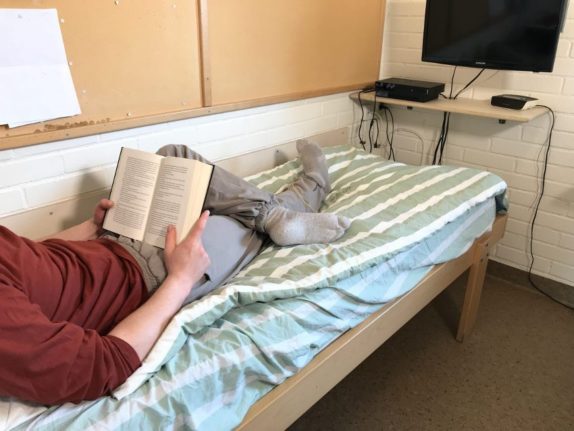How many foreigners are in prison in Sweden?
According to the Swedish Prison and Probation Service, 2,820 of the 8,960 people who began a prison sentence in 2020, about 31 percent, lacked Swedish citizenship, meaning foreigners are significantly over-represented.
What help can foreigners get from the embassies when in prison in Sweden?
Consular staff from many countries will help you contact relatives back home, and also contact Sweden’s authorities on their citizens’ behalf if they report mistreatment.
“The Embassy provides impartial, non-judgemental assistance to British citizens who have been arrested or are in jail in Sweden. We aim to make sure they are treated properly in line with Swedish regulations, and no less favourably than other prisoners,” the UK embassy told The Local in a statement.
The UK embassy also has a ‘prisoner pack‘ explaining the system in Sweden and what help those sentenced to imprisonment can expect from them. The German embassy has a list of German-speaking lawyers citizens can call on if arrested.
READ ALSO: What happens if a foreigner gets arrested in Sweden
Is it possible to get released early, and serve less than your full sentence?
Prisoners in Sweden typically serve two thirds of their sentence so long as they behave well. This is called villkorlig frigivning, or “parole”. It only applies to sentences longer than one month.
What right do you have to serve your sentence in your home country?
To get a transfer to their home countries the prisoner should first inform the prison of their interest in applying. They can then make a formal application by filling in this form.
How successful they are likely to be depends on where their home country is.
In 2021, 148 prisoners were transferred from Sweden to another country, 13 of them to another Nordic country and 73 to another EU country. None were transferred to countries outside the EU.
Is it possible to get leave from prison to visit family or attend important events?
In Sweden, prisoners can apply for and be granted “permission“, to leave the prison for a certain number of hours to, for example, visit the Swedish Public Employment Service, go to Alcoholics Anonymous, or visit family.
According to Ulf Mossberg, a press officer at the Swedish Prison and Probation Service, prisoners could even be granted permission to leave Sweden for a short period.
“A detainee can be granted permission to go to another land only if there are special reasons and sufficient control can be maintained. Special reasons could include, for example, a visit to a loved one who is close to death,” he said.
What difference does a prisoner’s home country make for transfers?
A lot. Within the Nordic countries, there is a well-established system that enables citizens of other Nordic countries who are given a prison sentence in Sweden to serve part or all of their sentence in their home country.
Since 2015, there has also been a European Union framework for transfer of prisoners back to their home countries, Ulf Mossberg, a press officer at the Swedish Prison and Probation Service, told The Local.
The UK also has a Prisoner Transfer Agreement with Sweden.
Mossberg said that transfers outside the EU tended to be difficult to arrange.
“In addition to the fact that both countries need to agree on a transfer, it is generally the case that there needs to be a certain standard and humanitarian values in the countries that are to take over the convicted person in order for a transfer to be possible,” he said. “In some countries, prison conditions are poor, which means that Sweden cannot transfer convicts to all countries. Some countries have no agreement at all with Sweden.”
According to Mossberg, arranging a transfer in these cases can be so complex and time-consuming that the sentence is over before it happens. More often than not the delay comes from lengthy court processes in the prisoner’s home country.
“A common obstacle to being able to transfer convicts is that the transfer process can be very long while the sentence times are often short,” he said.



 Please whitelist us to continue reading.
Please whitelist us to continue reading.
Member comments